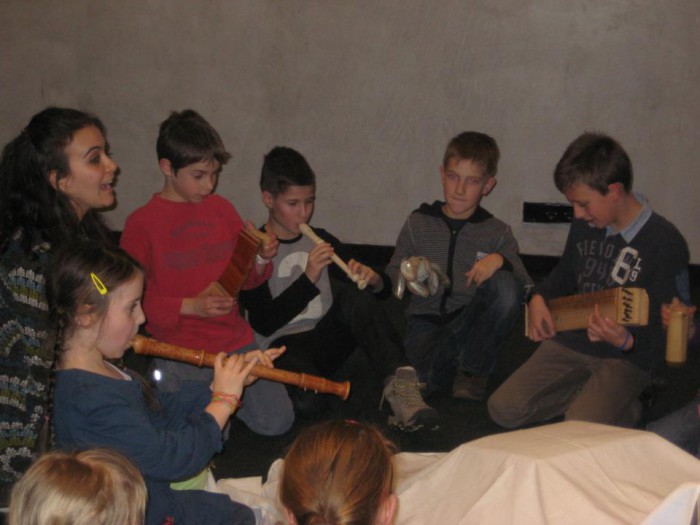The original project, whose adoption and development we are working on, was initiated by the violinist-humanist Lord Yehudi Menuhin. He launched the multicultural programme MUS-E (Musique-Europe) as the EU’s programme linked to the UNESCO project called “The decade of the world’s cultural development” in 1993. The main idea was enhancing tolerance through art education. Lord Menuhin believed, like we do, that this kind of education has a beneficial effect on the personal development and the social behaviour of young individuals. When he formed his concept, he primarily had culturally and socially disadvantaged children in mind. He thought that “animators” had to be invited to schools, i.e. artists from outside the school. Menuhin says that “singing, dancing, mimics and martial arts bring the body to harmony with the spirit, emotions with sense, and sense with emotions.” Art helps us channel our energies in one direction, turning destructive energies to creative ones. “Art based on self-expression contributes to the individual’s ability to develop flexible, adaptive strategies to deal with difficult situations in life.” In other words, to find one’s way in the adventurous and sometimes cruel reality of life (to use the Minister’s words). The most important thing in the MUS-E programme is not learning art but learning through art. One must have experience of art, and this experience has to arouse curiosity and interest to discover more, and turn learning into pleasure. The language of art is potentially universal and everybody has the ability to do art. Talent is not a personal quality but a state that can be developed and turned into true creativity and productivity. Creative training helps the individual to find one’s own in-born or forgotten culture, but his will also lead to the discovery, recognition and respect of the different cultures of others. Participating in artistic groups provides an opportunity to form a “common culture” and to confirm one’s sense of belonging to a community. It helps bridge social gaps, especially in a multicultural environment. “Art is a means of developing respect for oneself and for others.” As art helps us to get into a harmonious relationship with ourselves and others, we will sooner or later be able to respect others, recognise and appreciate the differences, and this way art can contribute to the development of respect for oneself and for others. One of the basic concepts of MUS-E is that art and school (joined together but respecting the differences between the two) can enrich each other. Thus, art is not a “consumer product” but a means to develop the personality.
The aim of the MUS-E programme (extracts from the international foundation document)
- Prevention of racism and social segregation
- Developing an ability to react positively to pressure
- The promotion of social dynamics based on trust and respect
- Prevention of risks threatening young individuals (violence, anti-social behaviour, addiction to drugs, etc.)
- The development of a mentality that is able to fill the life of human beings with humanity
- Developing a dynamic relationship between project-member countries of Europe through personal meetings, exchange programmes and common activity.
Special aims
To enable the child
- to participate actively in the activities of the MUS-E programme
- to awake his/her own creativity
- to express emotions and associate them with the emotions of others
- to communicate with others
- to discover silence
- to acquire the ability to respect oneself and others (physically and mentally)
- to develop self-confidence
- to develop self-discipline and a sense of responsibility
- to get acquainted with the culture of his/her own environment and that of his/her area and other countries
- to be open to new ideas and different customs
- to be independent, so that after the project s/he should be able to find other means of artistic development
Lord Menuhin, who ran the programme until his death, appointed co-ordinators in the participating countries for choosing schools and artists for the programme, and for keeping contact with the International Yehudi Menuhin Foundation (Brussels). This foundation is still the institutional centre of the project, which organises the main contact event of the project, the training sessions with EU support every year. These workshops ensure that participants of the European project exchange their experiences and get further training.

..
